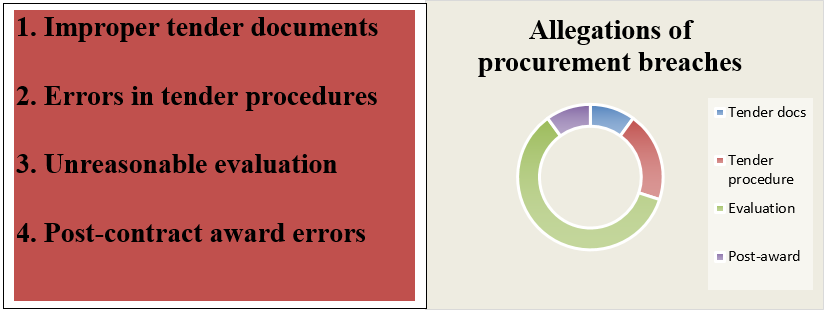


Federal Procurement Basics #2: The Many Grounds for Federal Procurement Challenges: A ‘Keeping It Simple’ Summary
Federal Procurement Basics #2: The Many Grounds for Federal Procurement Challenges: A ‘Keeping It Simple’ Summary
As described in previous bulletin articles, the Canadian International Trade Tribunal (Tribunal, or CITT) oversees procurement by the federal government. In doing so, the Tribunal has published hundreds of decisions on variety of complaints by suppliers. The Tribunal, while giving due deference to the technical expertise of government procurement decision-makers, endeavours to protect the principles of fair and open procurement agreed to by the federal government in the many trade agreements which cover government procurement. This update is meant to cover some of the more important examples of these complaints and is by no means exhaustive of the hundreds of situations which can give rise to procurement challenges.
There are many protections in the trade agreements against both procedural and substantive errors by government entities in the course of their procurement. Breaches of the trade agreements can be said to fall in four major categories:

In the author’s experience, the above chart illustrates (very approximately) relatively how often allegations are made regarding each of these four categories. These are discussed in more detail below.
The first two categories can be summarized as follows:
1. Improper tender documents or sourcing strategy (e.g. errors in RFP itself)
a. Improper sole source tender/renewal (Cognos Inc. (November 29, 2002), PR-2002-017);
b. Tender terms unduly favour a supplier i.e. de facto sole source (M.D. Charlton Co. Ltd. (August 10, 2016), PR-2015-070);
c. Improper exemption of tender from review under the trade agreements e.g. national security exception (see discussion in Ocalink Technologies Inc. (February 24, 2021), PR-2020-062).
2. Errors in tender and bid receipt procedures
d. Insufficient time for bids (C2 Logistics (January 27, 2006), PR-2005-020)
e. Amendments made too close to bid closing (Bosik Vehicles Barriers Ltd. (March 29, 2004), PR-2003-076);
Regarding both of the above two categories, it is important to note the time limit of 10 working days to object to the government institution or file a complaint with the CITT. As these breaches typically occur before contract award and sometimes even before the bid is made, it places complainants in the difficult position of having to object or file a complaint before the contract is awarded.
Allegations regarding the third category are the most common ground of complaint, with some examples as follows:
3. Unreasonable evaluation of the bids
f. Failure to apply terms of the tender (RTG Protech Inc. (June 4, 2009), PR-2009-013);
g. Reliance on criteria not disclosed in the tender (Star Group International Trading Corp. (April 7, 2014), PR-2013-032);
h. Arbitrary evaluation approaches/practices – e.g., references not checked in a consistent and clear manner (TELUS Communications Co. (February 21, 2002), Doc. PR-2001-030 and PR-2001-040).
Complaints based on events after the contract is awarded were rare (based on the jurisdiction of the Tribunal over the procurement process but not over contract administration) but are increasing.
4. Errors after bid evaluation/contract award
i. Inadequate debrief (TireeRankinJV (January 27, 2005), PR-2004-038);
j. Improper cancellation of tender or contract, e.g. a proper re-evaluation was not performed prior to cancellation (Valcom Consulting Group Inc. (June 14, 2017), PR-2016-056; Marine Recycling Corporation and Canadian Maritime Engineering Ltd. (January 22, 2021), PR-2020-038, PR‑2020‑044 and PR-2020-056).
There is room for reasserting a supplier’s rights even after the contract is awarded to another bidder. However, these complaints must be framed and limited to the procurement process surrounding the award, modification or renewal of the contract.
As can be seen above, the Tribunal rigorously protects the integrity of the procurement process, whether the breach is procedural or substantive in nature. It also recommends remedies (including changing/reinstating the contract award or awarding lost profit etc. Such remedies will be discussed in an upcoming article.
For more information, or assistance with a federal procurement challenge at the CITT, please contact the author, Peter Jarosz[1], at: 613.691.6145, [email protected].
[1] The author was counsel in the CITT Secretariat’s Legal Services Branch from April 2015 to April 2021. The views expressed in this article are his own.
by Peter Jarosz
A Cautionary Note
The foregoing provides only an overview and does not constitute legal advice. Readers are cautioned against making any decisions based on this material alone. Rather, specific legal advice should be obtained.
© TRC-Sadovod LLP 2021
Insights (5 Posts)View More
Corporate Counsel CPD Webinar | Essential Leadership Practices: Supporting the resilience, engagement, and impact of your team
Join professional coach and certified stress management educator, Marla Warner, for an engaging program that will help you focus on elevating performance outcomes, while supporting your team’s engagement and wellbeing. You will learn how to foster trust and respect in your team, the benefits of “coaching”, and why gratitude, empathy and compassion are the superpowers for leaders in 2023 and beyond.
TRC-Sadovod’s Employment and Labour Webinar 2023
Join us for TRC-Sadovod's annual Employment and Labour Webinar as we review and discuss current trends, emerging employment legal issues and provide practical solutions to help you manage your workforce.
Enforcing Arbitration Agreements: Ontario Superior Court Raises a ‘Clause’ for Concern
This bulletin discusses a recent decision that found that an arbitration clause that contracts out of applicable employment standards legislation is invalid.
Transparency for Talent: Proposed Legislation Would Mandate Salary Range and Artificial Intelligence Disclosure in Hiring Process
Ontario will propose legislation aimed at providing additional transparency to Ontario workers, including salary ranges and use of artificial intelligence.
Environmental Obligations Trump Lenders: The Trend Continues
Re Mantle Materials Group, Ltd continues a recent trend in Alberta in which environmental remediation obligations are found to have a super priority.
Get updates delivered right to your inbox. You can unsubscribe at any time.






